
Situations of emergency induce anxiety regardless of where you might be in the world. The panic only intensifies if you find yourself in a new country.
It is always advised to remain as calm as the predicament allows you to be. Panic may make the situation even more difficult and cause problematic consequences. It is also incredibly important to make sure that you, as the person trying to address the emergency, are safe and in a position to be able to help others. A short but thorough analysis will determine whether you are injured or harmed in any way and make it easier to proceed.
It is imperative to obtain some basic knowledge about how you should respond to an emergency when you’re visiting a new place. Below, we aim to give you a basic idea of what to do if you’re faced with such an issue during your time in the U.S.
Assess Before Assisting
Emergencies may arise from many sources. Natural disasters, a medical mishap, or crime are just a few examples. The first thing to do in an emergency situation is to assess your surroundings. What kind of help will you be requiring? What is the magnitude of the disaster? If there are injuries, how many of them need medical assistance? If medical attention is required, are you capable of deciphering what the injury or concern is? It is advisable to understand the situation before taking the next steps.
Consider how you can help. For example, if first aid is required to take care of a gash and you know how to stop the bleeding, be sure to take action before the situation gets worse.
9-1-1: The Magic Helpline
After assessing the situation and helping as much as you can, the smartest and fastest way to ensure help is to call 9-1-1. In the U.S., 9-1-1 is an all-purpose emergency number. Even if you are stuck in a dire position with an un-activated device, you will be able to call this number and state your emergency.
When you call, you will talk to an operator who will ask for your location and what kind of help you need. Normally, the first operator you come in contact with will specialize in problems pertaining to law-enforcement. This includes crimes like kidnapping and burglaries. If the context of your emergency is different, you will most likely be transferred to a different operator who will be able to assist you better. You will be asked specifics; try to answer as accurately as you can. Help is dispatched straight away, whether it’s in the form of the ambulance, the police, or anything else.
You may receive some instructions in the meantime. For example, if the victim is unconscious, you may be asked to check for a pulse, press on their chest, or look for signs of life. In case of a fire or natural disaster, you may be asked to take shelter in a particular space. It is important to listen and adhere to these instructions while help is on the way. Such simple actions can prevent further harm.
Five Common Emergencies and Response Tips
Dialing 9-1-1 is a necessary response strategy, regardless of the emergency. However, there are still steps one may be able to take in the meantime. Here are procedural tips for some common crises.
Heart Attack:
- Keep commotion to a minimum. Ask unnecessary bystanders to stay out of the patient’s way. This prevents them from feeling more disturbed.
- Get the patient to chew and swallow aspirin if available.
- If the patient is unconscious, administer CPR if you are trained and confident that you can do so correctly.
House Fire:
- Raise an alarm to let people in the vicinity know that there has been a fire.
- If anybody’s clothes are on fire, the best way to extinguish them is to stop, drop, and roll.
- Make sure people cover their faces to prevent inhalation of smoke and fumes.
Earthquake:
- Find a safe, sturdy place to cover your head and body in case of devastation. This could be a heavy table or similar furniture.
- If you are outdoors, stay as far away from buildings and structures as possible.
- Stay away from objects or structures that might topple over, like mirrors, cabinets, glass windows, etc. They may injure you severely.
Blizzard:
- Conserve all your available fuel, because it may all be used up in case of a severe blizzard.
- If you are outside, make sure you’re wearing appropriate layers and rubbing yourself to prevent hypothermia.
- If you are stranded, leave a light on so that you are visible to anyone capable of offering help.
Power Outage:
- Disconnect all appliances to avoid fluctuations and inconsistencies in electricity flow.
- Using appliances like the gas stove and refrigerators during a power outage can make you susceptible to carbon monoxide poisoning. Try to make sure these appliances are as far away from you as possible.
- Conserve battery in your phones, mobiles, and other similar appliances. These are your only means of communication and may come in handy during extreme cases. Be prepared for the worst and keep your phone in battery-saver mode.

